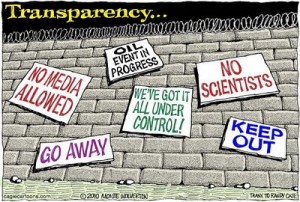Government Dodges Dire Gulf Claims
Last week, guest writer James Howard Kunstler wrote a compelling and controversial article on this site called, “What If He’s Right.” It was about shocking comments made by veteran oil analyst Matthew Simmons in an interview about some extreme dangers BP’s Gulf gusher pose. Kunstler did a great job with the article, but the comments were so alarming I felt further work was needed to verify Simmons’ claims. (Click here to go to the original article with links to Simmons’ interview.) So, I called the National Oceanic and Atmospheric Administration, or NOAA. The press office bumped me upstairs to the U.S. Department of Commerce. That is the federal agency which oversees NOAA. The Deputy Director of Public Affairs, Shannon Gilson, called to answer my many questions.
I told Gilson some of Simmons’ claims. One big claim I told her about was the assertion by the veteran petroleum analyst that there was a “giant lake of toxic oil under the Gulf.” She told me right then and there, “The data hasn’t born that out.” Gilson did confirm the finding of undersea oil that was “dispersed,” but no lake.
Another big claim Simmons makes is there could be some significant loss of human life if this pool of toxic oil was blown ashore during a hurricane. There are many other formidable claims in the Simmons’ interview, and he inferred he got his information from sources aboard the NOAA ship, Thomas Jefferson. Gilson told me she had not heard this particular interview and said, “Let me take a listen. Let me get back with you.” I thought that was the proper thing to do given the claims by Simmons were so frightful and horrible. We agreed to talk again at 2:00P the next day. A little after 2:00P the following day, I called and got voice mail. I called again a couple of more times before the end of the day and, still, got Gilson’s voice mail. At 5:30P, I received an email from Gilson that said in the subject line, “Sorry I missed your call.” The email was one single line that said, “The research team aboard the Thomas Jefferson has captured samples of subsurface oil, but has not found any scientific evidence of a “lake of oil.”
I sent Gilson a reply that said:
Shannon,
Matt Simmons makes many claims in the interview we talked about in detail. Is this all what NOAA and the Commerce Department is willing to say on record? What about the high amounts of what he calls “wet methane” under the water? Simmons says, If a hurricane comes, the coast should be “evacuated” for miles because of the toxic chemicals that will be blown inland. Simmons also says, the toxic oil and methane that could be pushed on shore could “be one of the greatest losses of life ever from a natural non war event.” John Kessler from Texas A&M says what’s coming out of the well is “40% methane” as opposed to the normal 5% commonly found in oil. I have many other questions about this interview with one of the top oil consultants in the world. May we talk?
Respectfully,
Greg Hunter
USAWatchdog.com
After this email, I sent another request for an interview with Ms. Gilson to debunk Simmons. I had many other questions about other controversial quotes from Simmons, but was not given the opportunity to ask. One of the more extreme was his suggestion for closing the runaway gusher with a “small” nuke deep under the ocean floor to melt the rock to shut off the flow of oil. If all of this is untrue or crazy, then why wouldn’t the government simply say so? Could every single thing Simmons said be wrong, or said for some hidden motivation? I don’t know, but government silence is not helpful, and it fosters a conspiracy sort of atmosphere. I do know one thing–silence on dire warnings from one of the most well known oil men in the world is just as discomforting.













Plausible Deniability?
Hog,
Maybe.
Greg
Government representatives don’t know what to say. Frankly I doubt Mr. Simmons and put him in a category with the Mayan Calendar Phobics. It may be that they are correct in which case the point is moot.
Our government is completely dishonest at this point as proven by the revelations coming out each day about the recent benevolent legislation. For your readers the best bet is to prepare for a societal breakdown that may last for some time. That kind of event will be life threatening. Food, water, gold, guns, ammunition, fuel, barter items. All these things should be accumulated. If not needed so what?
John,
You may be right but something is a little weird. NOAA has its own public affairs people to talk to the press. That is who I called and talked to when I started working on this post. I got a call back from the Deputy Director of Public Affairs at the Commerce Department. Something is a little weird there but that is just me. I certainly could be wrong. Thank you for the comment.
Greg
This arrticle is from Pravda and even more dire:
http://english.pravda.ru/world/americas/23-07-2010/114356-deepwater_armageddon-0
May they all be wrong!
Jan,
Good info for readers to consider. Thank you.
Greg
While Rome burns…
Cesare,
I feel the flames. Thank you.
Greg
Hi Greg,
The first casualty of war (or major crisis) is truth. We’ll never get the truth from the Gov’t we now have.
The following email was sent to me from an acquaintance who happens to be a research scientist. It is a response to my question to him on the validity of the Simmons article. I hope it isn’t too long for your comments thread.
“The existence of deep-sea methane clathrates (ices) is well documented. You may recall that the first BP attempts to seal the oil well was defeated by clathrates. There is an event in the geological record known as the PETM that probably was due to massive rapid release of methane from clathrates. See the graph below. The best documentation is from stable isotope data. Part of my Ph.D, dissertation was about stable isotope geochemistry so that I am familiar with the evidence.
“The Paleocene/Eocene boundary, 55.8 million years ago, was marked by the most rapid and significant climatic disturbance of the Cenozoic Era. A sudden global warming event, leading to the Paleocene–Eocene Thermal Maximum (PETM) is associated with changes in oceanic and atmospheric circulation, the extinction of numerous deep-sea benthic foraminifera, and a major turnover in mammalian life on land which is coincident with the emergence of many of today’s major mammalian orders.
“The event saw global temperatures rise by around 6°C (11°F) over 20,000 years, with a corresponding rise in sea level as the whole of the oceans warmed. Atmospheric carbon dioxide (CO2) concentrations rose, causing a shallowing of the lysocline. Regional deep water anoxia may have played a part in marine extinctions. The event is linked to a negative excursion in the δ13C isotope record, which occurs in two short (~1,000 year) pulses. These probably represent degassing of clathrates (“methane ice” deposits), which accentuated a pre-existing warming trend. The release of these clathrates, and ultimately the event itself, may have been triggered by a range of causes.
“No one has witnessed a clathrate release event in historic times, so we do not know how sudden and catastrophic such events are. As mentioned above we can detect two 1,000 year pulses, but they could have been much faster. So an event such as described in the Helium article is not unprecedented, but seems to be rare. There is only one such event documented in 65 million years. Note that the magnitude is comparable to the change from glacial to interglacial temperatures in recent geological history.
“Climate change during the last 65 million years. The Paleocene-Eocene Thermal Maximum is labeled PETM and is likely to be understated by a factor of 2 or more due to coarse sampling and averaging in this data set.”
Eli,
I am sure many readers will enjoy this. Thank you.
Greg
Greg,
Its been thirty years since I took Advance level Chemistry in college. I do remember that the higher the pressure, the more gas you can dissolve in a solution be it oil or water. There is a hell of a lot of pressure at the depths we are talking about here (4,000-5,000ft below the surface), and tens of millions of barrels of oil. Next time you pop a cork on a bottle of Champagne, watch the gas bubble out. IF this stuff gets stirred to the surface quickly, it is reasonable to expect the methane to bubble out .
I don’t know if this guy is right but I will tell you I find it out that the government didn’t positively deny it. When they first capped the well they said the pressure had to be a certain level or it was leaking. The pressure is not in the range that I remember it should be.
As far as his outlandish idea to stop this leak with a nuke; well, the soviets did it six to ten times during the cold war.
I think the Government should sue BP out of existence.
JJ,
I am not a scientist but this is an oil leak at a depth that is has never happened before. I don’t think even the scientists know what to expect. Thanks for the science lesson and comment!!
Greg
Good story, Greg.
There was a comment on the oil spill story over at
http://georgewashington2.blogspot.com/2010/07/matthew-simmons-lightning-rod-for-gulf.html#comments
The commenter said Simmons has stuck to his guns since day #1 whereas BP keeps changing its story. I know absolutely nothing about oil or geology but if I had to choose who do you think I would believe?
John,
Thank you for this. Folks need to get all angles on this story.
Greg
Thank you for your effort in trying to verify Simmons’ claims! SHAME ON NOAA FOR THEIR FURTHER OBFUSCATION OF THE TRUTH AND FOR NOT TREATING YOU RESPECTFULLY!
Jaedra,
Thank you. If what Simmons is saying is just plaine crazy and wrong then why not just say that publically? I have been a reporter long enough to know when I’ve been stiffed.
Greg
Greg,
If you are like me, you would very much like to be able to dismiss Mr. Simmons’ claim due to its horrific nature, but the problem is that Mr. Simmons appears to be so sincere!! (And I am aware of the claim that he has or did have a short position on BP stocks.) And now NOAA will not refute the claim?! WHAT IS GOING ON HERE?
Jaedra,
Good point.
Greg
Greg,
I hope its not lost on you that Mr Simmons die rather conveinently
George,
It was a sad moment. We lost an important voice.
Greg